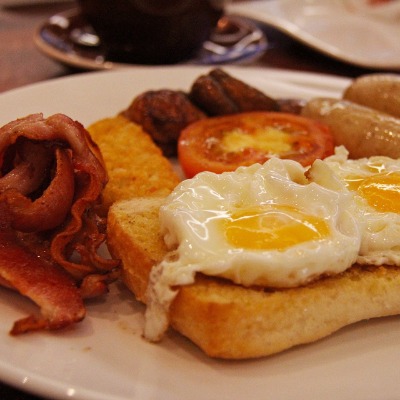
We’ve all heard it many times; everyone from our doctors to our friends says, “Keep your cholesterol in check, and avoid eating fatty foods.” In addition to increasing your risk for heart disease, cholesterol may also increase the rate at which cells in the intestine grow and divide, a characteristic of tumor formation. How cholesterol drives tumor growth was unknown, until a recent study by researchers at UCLA’s school of medicine found a possible mechanism.
Why is cholesterol important for this study?
Cell growth and reproduction are critical life processes which require large amounts of energy. This energy can be provided by fats, including cholesterol and phospholipids. These molecules also play a key role in the maintaining the structure and proper functioning of cells.
What are intestinal stem cells, and how are they related to colon cancer?
Our intestines have finger-like projections known as villi, and at the base of each villus is a crypt containing intestinal stem cells (ISCs). Stem cells are a special kind of cell- they are not committed to any particular job and can become whatever they want. When these cells divide, they give rise to 2 cells: one is an exact copy of the parent cell, and the other is a cell which can go on to become specialized. In the case of ISCs, they become villus cells. Cancer can develop when the specialization process is disturbed. ISCs have been shown to be the source for intestine tumors in laboratory mice.
The experimental evidence:
What’s the relationship between Lpcat3, cholesterol production, cell growth and tumor formation? How is cholesterol related to cell division?
Lpcat3 is a protein which is essential for cell membrane function; without it, the membrane can become rigid and its fluidity decreases. Mice lacking Lpcat3 had longer and wider intestines than mice with Lpcat3. Specifically, researchers noted that the crypts were taller and the villi were longer. A process known as immunostaining- where proteins are tagged- found that the ISCs were in a state of rapid cell division. Therefore, a deficiency in Lpcat3 leads to increased cell division.
Crypts from Lpcat3 deficient mice also had cholesterol levels 25% higher than in crypts from mice that did not lack Lpcat3.
Mice fed a high cholesterol diet had crypts with more ISCs compared to mice who ate a regular diet, suggesting that cholesterol drives cell division in ISCs. These crypts also showed a 15% increase in cholesterol content. Therefore, the availability of cholesterol in the cell’s environment affects its ability to divide. Can suppressing the production of cholesterol reduce ISC growth and division? When researchers gave a cholesterol suppressing substance to mice lacking Lpcat3, they found that crypt height was lower and there were less ISCs.
Finally, we know that Lpcat3 deficiency can cause cell division, but can it promote the growth of tumors? When researchers mated Lpcat3 deficient mice with mice lacking a tumor blocking gene, some of the offspring inherited both defects. These offspring suffered from tumors, bleeding and anemia.
This study presented many dangers of too much cholesterol. The takeaway from this article shouldn’t be heightened fear. The information should be used to help us decide which foods to eat. Diet is something that is in our control and implementing preventative measures could protect us in the long run.
Research Paper: “Phospholipid Remodeling and Cholesterol Availability Regulate Intestinal Stemness and Tumorigenesis”
